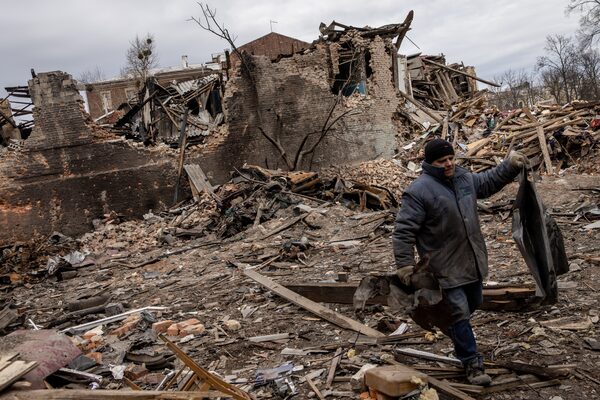
Beyond the Canadian Red Cross, there are several registered charities that support specific needs in Ukraine. To fund humanitarian efforts, there are the Canada-Ukraine Foundation and the Ukranian Canadian Congress.Chris McGrath/Getty Images
Sign up for the new Globe Advisor weekly newsletter for professional financial advisors on our newsletter sign-up page. Get exclusive investment industry news and insights, the week’s top headlines, and what you and your clients need to know.
Canadians have responded to Russia’s invasion of Ukraine with an outpouring of charitable donations.
The Canadian Red Cross had collected $119-million (including $30-million in matching funds from the federal government) as of March 21 – less than one month after war broke out. Canadians have also contributed through less traditional channels – for example, booking Airbnb Inc. accommodations in Ukraine without plans to travel there, or arranging wire transfers to individuals co-ordinating humanitarian support on the ground.
Tina Tehranchian, senior wealth advisor with Assante Capital Management Ltd. in Richmond Hill, Ont., has received calls from clients asking about charities that were suggested to them that they’d never heard about. She tends to steer them toward better-known entities such as the Red Cross, the United Nations High Commissioner for Refugees, the United Nations Children’s Fund and World Vision International.
“Well-established charities and international organizations that have experience in international crisis situations are the best and most secure way of helping the people of Ukraine,” she says. “The fact is there are many scams going on these days and it’s important to be vigilant and ensure that your donations end up in the hands of the charity that you want to support.”
Ms. Tehranchian warns clients never to click on a link or attachment to donate online and instead enter the URL address to donate. She says to always to use a credit card rather than a debit card for additional layers of protection, and never to donate in the form of gift cards or wire transfers because those are the easiest for scammers to take advantage of.
She also recommends that clients who are interested in philanthropy have an annual amount in mind for ad-hoc donations to address urgent charitable needs.
“There’s always going to be a disaster or crisis somewhere in the world,” Ms. Tehranchian points out. “If helping out in humanitarian situations is important to a donor, they should definitely have a part of their charitable donation budget allocated to that so that they have it available depending on where the need arises.”
The benefits of co-ordinating with an expert
Andrew McQuiston, senior portfolio manager, and Kelly Demo, senior wealth advisor and portfolio manager, with West Oak Family Office at Wellington-Altus Private Wealth Inc. in Calgary, work with Gena Rotstein, co-founder of Calgary-based Karma & Cents, to help clients achieve their philanthropic objectives.
“She susses out charities or even helps create specific programs that align with the family’s values and what they want to accomplish with their philanthropic capital,” Mr. McQuiston says. “She’ll consult and create a framework for helping them with their overall endeavours.”
Ms. Demo adds the West Oak team’s expertise is on the tax planning side of philanthropy, and that they don’t have the resources or expertise to determine which charitable organizations will enable clients to maximize their impact.
“We partner with Gena because she helps us a lot on the subjective side of things – finding these places to give to,” she says.
Beyond the Canadian Red Cross, Mr. McQuiston says Ms. Rotstein recommends several registered charities that support specific needs in Ukraine. To fund humanitarian efforts, there are the Canada-Ukraine Foundation and the Ukranian Canadian Congress. To fund think tanks analyzing the impact of the war, there’s Chatham House and the MacDonald-Laurier Institute. For clients interested in investigative journalism and fighting Russian propaganda, there’s The Local, which is based in Austria, so there’s no donation tax credit.
“When you have [ultra-high-net-worth] people who can change directions materially, sometimes, in organizations with the gifts that they give, then I think there’s a bigger responsibility on us and our clients to make sure that amount goes to the right organizations [and] that there’s more planning around that gift in terms of structuring it,” Ms. Demo says.
Planning for longer-term impact
Meanwhile, a donor-advised fund can be a good middle-ground for clients because it provides the convenience and simplicity of a one-time small-scale donation and eliminates the time and money required to oversee a private foundation. West Oak partners with the Charitable Gift Funds Canada Foundation to establish donor-advised funds for its clients.
“It’s a huge public endowment fund, but it allows us to be very strategic with our clients about giving – in terms of tax and bringing families together to decide to where, to whom, and how much to give to,” Ms. Demo says.
Compared with a private foundation, a donor-advised fund makes it much easier to change directions and respond to pressing needs like the situation in Ukraine as there’s no need to get board approval for a change of mandate. At the same time, Mr. McQuiston emphasizes that a donor-advised fund “opens a door for opportunities to create a longer-term impact.”
That’s important with Ukraine facing many years of rebuilding, long after the bombs stop falling and the immediate humanitarian crisis has eased. Overall, a shift in perspective from the short term to a longer-term strategy can help maximize client impact when it comes to other charitable causes as well.
For more from Globe Advisor, visit our homepage.